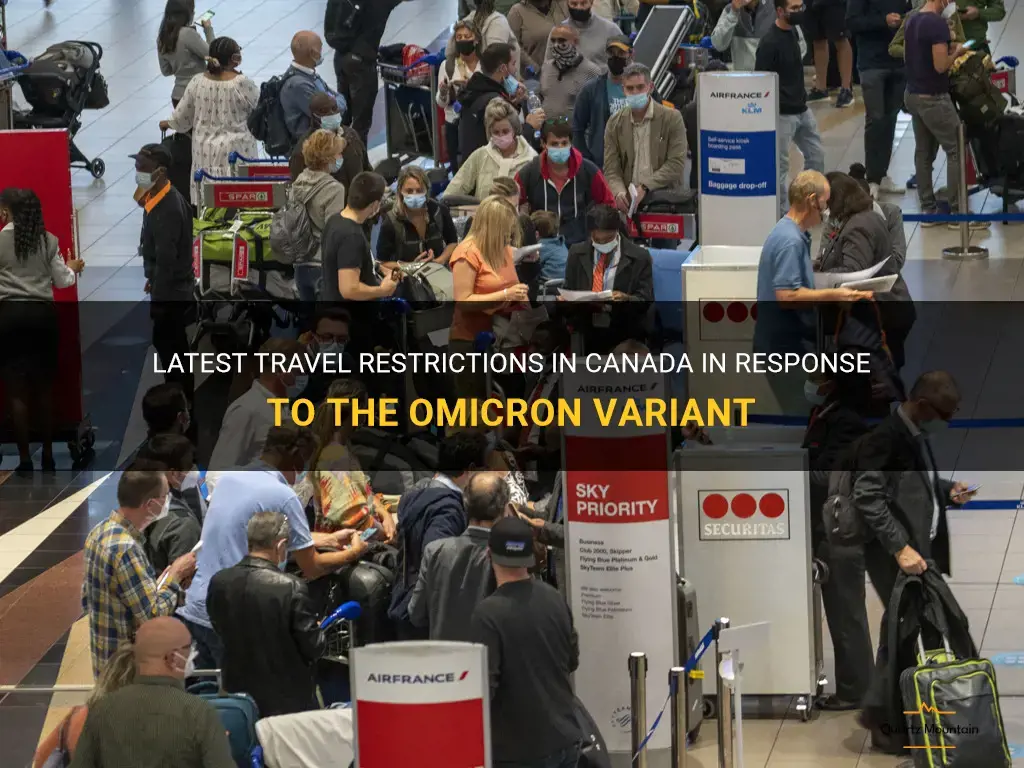
As the Omicron variant of COVID-19 continues to spread across the globe, countries are taking extra precautions to protect their citizens and prevent the spread of the virus. Canada, known for its stunning landscapes and welcoming culture, is no exception. With the emergence of the Omicron variant, travel restrictions have been implemented to control the entry of potentially infected individuals into the country. These new regulations aim to maintain the safety of Canadians and mitigate the impact of the variant on public health. In this article, we will explore the travel restrictions Canada has put in place in response to the Omicron variant and the implications they may have on travel plans.
What You'll Learn
- What are the current travel restrictions in Canada due to the Omicron variant?
- Are there any exceptions to the travel restrictions in Canada related to the Omicron variant?
- How long are the travel restrictions in Canada expected to be in place for the Omicron variant?
- Are there any specific areas in Canada that have stricter travel restrictions due to the Omicron variant?
- What are the requirements for quarantine and testing for travelers entering Canada during the Omicron variant travel restrictions?

What are the current travel restrictions in Canada due to the Omicron variant?
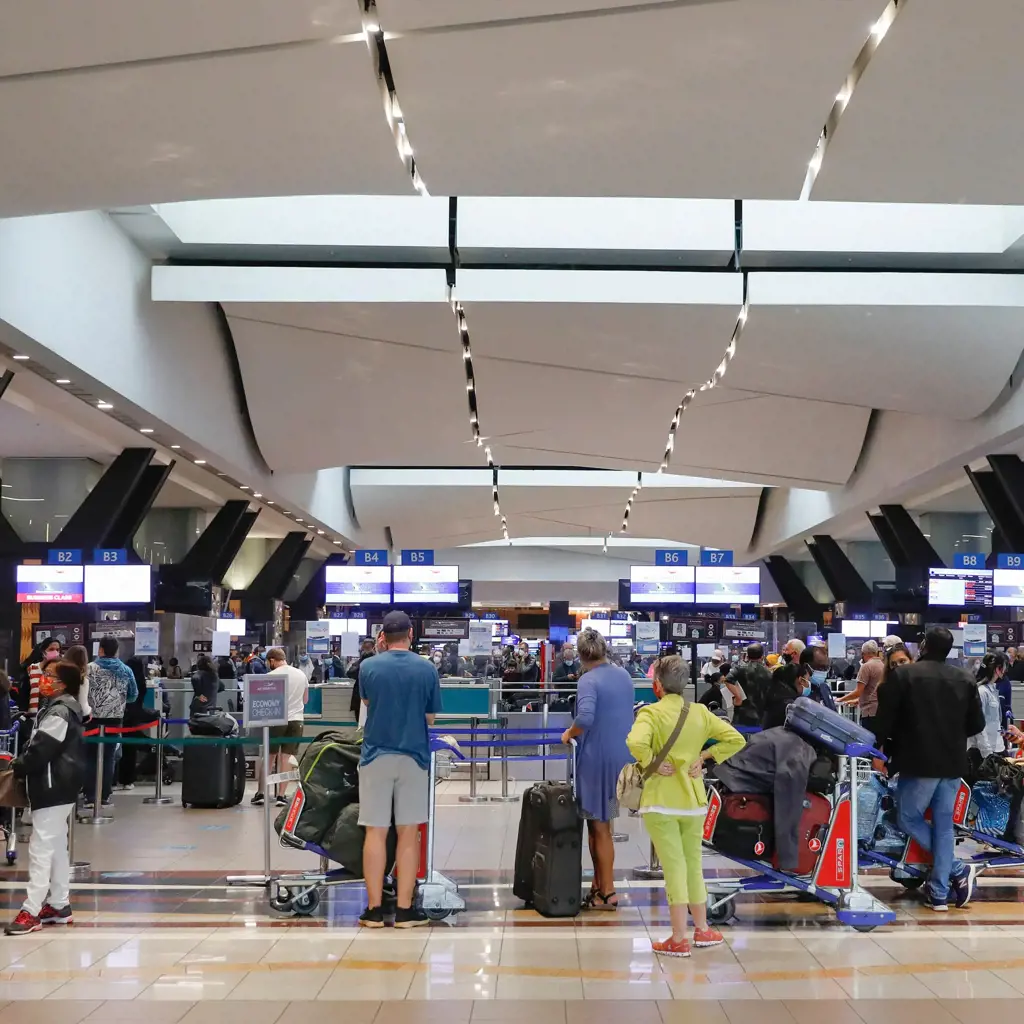
As the Omicron variant of COVID-19 continues to spread across the globe, many countries, including Canada, have implemented new travel restrictions to prevent its entry and spread within their borders. These measures are being enforced to protect public health and prevent a surge in new infections.
In Canada, the government has introduced several travel restrictions specifically aimed at preventing the transmission of the Omicron variant. These restrictions apply to both domestic and international travelers entering the country.
For domestic travelers, each province and territory has the authority to implement their own travel restrictions and guidelines. Some provinces may require proof of vaccination or negative COVID-19 tests for entry, while others may restrict non-essential travel altogether. It is important for travelers to check the specific requirements of their destination province before embarking on any domestic trips.
For international travelers, regardless of vaccination status, there are several requirements in place to enter Canada. These requirements include providing proof of a negative COVID-19 test taken within 72 hours before departure, completing a COVID-19 test upon arrival, and submitting travel and contact information through the ArriveCAN app or website. Travelers must also have a suitable quarantine plan in place, in case they test positive for COVID-19 upon arrival.
In addition to these general requirements, there are specific measures in place for travelers arriving from countries and regions of concern, which include several countries where the Omicron variant has been detected. These measures may include additional testing, stricter quarantine requirements, or even a ban on entry for non-Canadian citizens or permanent residents.
For example, as of December 1st, 2021, non-Canadian citizens and non-residents who have been in South Africa or Botswana in the 14 days prior to their arrival in Canada are banned from entering the country. Canadian citizens, permanent residents, and their immediate family members who have been in these countries are allowed to enter, but they must undergo additional testing and quarantine requirements.
It is important for travelers to stay updated on the latest travel restrictions and requirements, as they are subject to change based on the evolving situation and new information about the Omicron variant. The Government of Canada's official travel website and the websites of provincial health authorities are reliable sources of information for current travel restrictions.
In conclusion, the current travel restrictions in Canada due to the Omicron variant include requirements for proof of vaccination, negative COVID-19 tests, and the submission of travel and contact information. There are also specific measures in place for travelers arriving from countries and regions where the variant has been detected. It is crucial for travelers to stay informed and follow these restrictions to help contain the spread of the Omicron variant and protect public health.
Exploring the Implications of Medications Travel Restrictions for Over the Counter Drugs
You may want to see also

Are there any exceptions to the travel restrictions in Canada related to the Omicron variant?
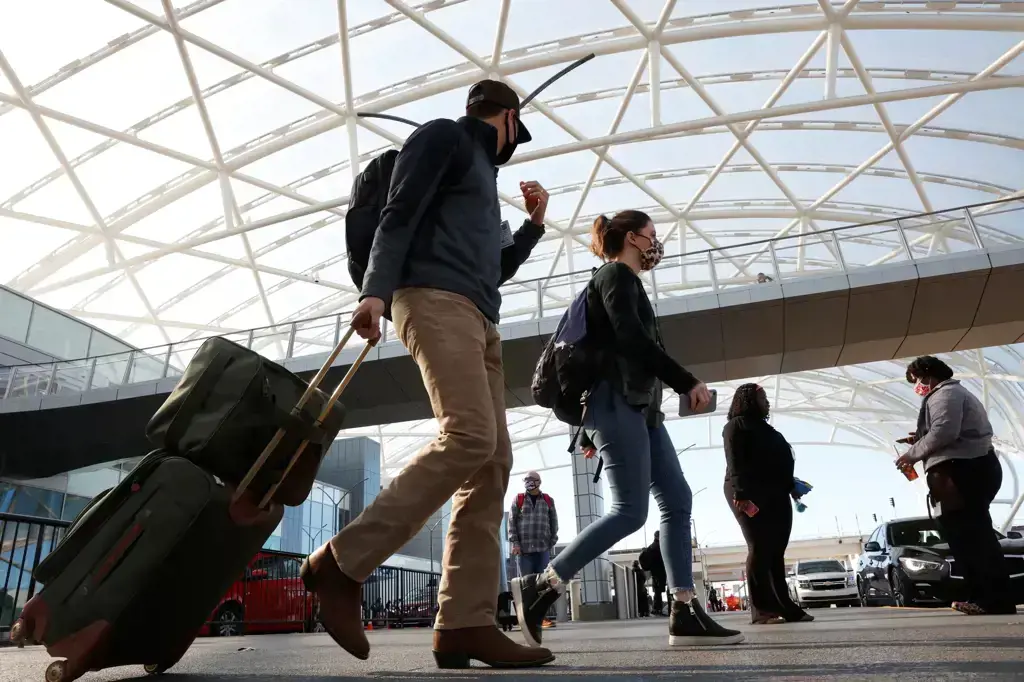
As the Omicron variant of the COVID-19 virus continues to spread globally, countries around the world, including Canada, have implemented travel restrictions to mitigate the risk of transmission. These travel restrictions aim to curb the importation of the variant and protect public health. However, there are some exceptions to the travel restrictions in Canada related to the Omicron variant.
One of the key exceptions is for Canadian citizens, permanent residents, and their immediate family members. These individuals are allowed to enter Canada, regardless of the presence of the Omicron variant. This exception ensures that Canadian citizens and permanent residents can return home and be reunited with their families during these challenging times.
In addition, individuals who have received specific authorization from the Canadian government are also exempt from the travel restrictions. This includes people involved in essential services, such as healthcare workers, diplomats, and individuals who are providing critical support to the Canadian economy. These exemptions are crucial to ensure the continued function of key sectors and protect the well-being of the Canadian population.
Furthermore, there are some exemptions for individuals who need to travel for compassionate reasons. In situations where there is a serious illness, end-of-life care, or critical family reunification, individuals may be granted permission to enter Canada. These exemptions recognize the importance of family and the need for support during difficult times.
It is important to note that even with these exceptions, stringent public health measures are in place for those entering Canada. Individuals still need to provide proof of a negative COVID-19 test before boarding their flight and must undergo mandatory quarantine upon arrival. These measures are designed to minimize the risk of transmission and protect public health.
Overall, while there are exceptions to the travel restrictions in Canada related to the Omicron variant, they are limited to individuals who meet specific criteria. The Canadian government is taking a cautious approach to ensure the safety and well-being of its population while allowing for essential travel and reuniting families in exceptional circumstances. It is crucial for individuals to stay informed and follow the latest guidelines and requirements set forth by the Canadian government when planning their travel.
The Latest Updates on Travel Restrictions to Jamaica: What You Need to Know
You may want to see also

How long are the travel restrictions in Canada expected to be in place for the Omicron variant?
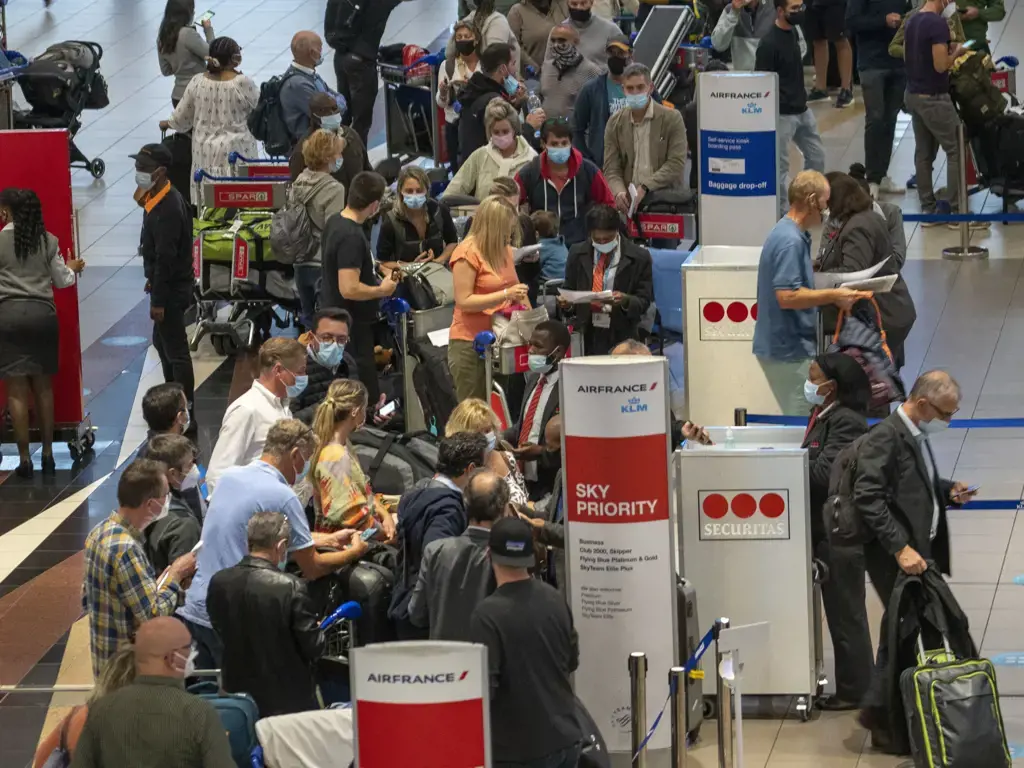
As the Omicron variant of the COVID-19 virus continues to spread across the globe, governments around the world are implementing travel restrictions in an effort to contain its transmission. In Canada, the government has also imposed several travel restrictions to prevent the entry and spread of the Omicron variant within the country. These restrictions are expected to remain in place for a certain period of time, but the exact duration is still uncertain.
The Canadian government is closely monitoring the situation and is in constant communication with health authorities and international partners to assess the impact of the Omicron variant. The duration of the travel restrictions will largely depend on the epidemiological situation, the level of community transmission, and the effectiveness of the existing measures in containing the spread of the variant.
At present, the Canadian government has announced a temporary ban on all passenger flights from several African countries, where the Omicron variant was first detected. This ban is expected to be in place for at least two weeks, starting from the date of the announcement. This timeframe allows the government to gather more information about the variant and assess its implications for public health in Canada.
In addition to the flight ban, the Canadian government has also implemented stricter quarantine measures for individuals entering the country, regardless of their vaccination status. All travelers, including Canadian citizens and permanent residents, are required to take a COVID-19 test both before and after arrival, and to quarantine for a period of 14 days. These measures are aimed at minimizing the risk of transmission and detecting any potential cases of the Omicron variant early on.
However, it is important to note that the duration of these travel restrictions may be subject to change based on the evolving situation. The Canadian government is continuously monitoring the spread of the Omicron variant and will adjust its measures accordingly. If the variant spreads rapidly and poses a significant risk to public health, the government may extend or modify the existing restrictions to further protect the population.
In summary, the travel restrictions in Canada for the Omicron variant are expected to be in place for at least two weeks, which is the duration of the current flight ban from certain African countries. However, the duration of these restrictions may be extended or modified based on the evolving situation and the impact of the variant on public health. The government's priority is to protect the population and prevent the spread of the Omicron variant, and it will continue to make decisions based on scientific evidence and expert advice.
Exploring Grenada: Are There Travel Restrictions to the Spice Isle?
You may want to see also

Are there any specific areas in Canada that have stricter travel restrictions due to the Omicron variant?
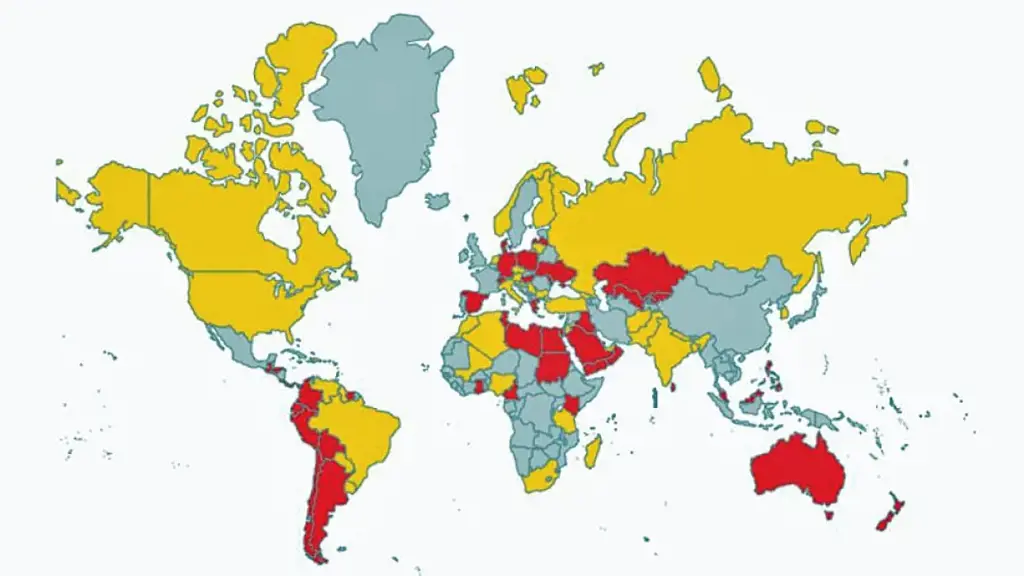
As the Omicron variant of COVID-19 continues to be a concern worldwide, countries have been implementing various travel restrictions to prevent its spread. In Canada, while there are no specific areas with stricter travel restrictions due to the Omicron variant, the federal government has introduced several measures to reduce the risk of importation and transmission.
One of the main measures implemented by the Canadian government is the requirement for all air travelers entering Canada to provide proof of a negative PCR test taken within 72 hours before boarding their flight. This applies to both vaccinated and unvaccinated individuals. In addition, travelers must also take a PCR test upon arrival and undergo a 14-day quarantine, regardless of their vaccination status.
In terms of specific areas within Canada, there are no individual provinces or territories that have stricter travel restrictions solely due to the Omicron variant. However, provinces and territories have the authority to implement their own additional measures to protect their population. For example, the province of Ontario has implemented a proof of vaccination system for certain high-risk settings, such as indoor dining and gyms, to reduce the risk of transmission. This measure is not specific to the Omicron variant but is part of the province's overall strategy to combat the spread of COVID-19.
It is important to note that the situation regarding travel restrictions and measures can change rapidly. The Canadian government closely monitors the situation and adjusts measures accordingly based on evidence and expert advice. As new information emerges about the Omicron variant, additional measures may be implemented in the future to further protect public health.
Overall, while there are no specific areas in Canada with stricter travel restrictions solely due to the Omicron variant, the federal government has implemented measures to reduce the risk of importation and transmission. Travelers entering Canada must provide proof of a negative PCR test, undergo a PCR test upon arrival, and quarantine for 14 days. Provinces and territories may also have their own additional measures in place to protect their population. It is important for travelers to stay informed and comply with the latest requirements to ensure their safety and the safety of others.
Understanding the Travel Restrictions Imposed on Probationers in New Mexico
You may want to see also

What are the requirements for quarantine and testing for travelers entering Canada during the Omicron variant travel restrictions?

As the Omicron variant continues to pose a threat, Canada has implemented strict travel restrictions to prevent the spread of the virus. All travelers entering Canada are now required to adhere to specific quarantine and testing measures. These requirements aim to protect the health and safety of both local residents and visiting travelers.
Quarantine Requirements:
- Length of Quarantine: Travelers must quarantine for a period of 14 days upon arrival in Canada. This quarantine period allows for the potential incubation period of the virus and helps to minimize the risk of transmission.
- Quarantine Location: Travelers must have a suitable quarantine location lined up before arriving in Canada. This can be a private residence, hotel, or other accommodation that allows for the necessary quarantine period.
- Quarantine Plan: Travelers must have a detailed quarantine plan in place, outlining how they will safely complete their quarantine period. This includes provisions for food, medication, and daily essentials, as well as plans for any necessary medical care during the quarantine period.
Testing Requirements:
- Pre-Arrival Testing: All travelers, regardless of their vaccination status, must provide proof of a negative COVID-19 test result taken within 72 hours before their flight to Canada. This test can be either a PCR or a rapid antigen test.
- Arrival Testing: Upon arrival in Canada, travelers are required to take a PCR test at the airport or port of entry. This test will be conducted by Canadian Border Services Agency (CBSA) officials or a designated healthcare professional.
- Follow-up Testing: Travelers must also take a second PCR test on day 8 of their quarantine period. This test can be self-administered at home under the guidance of a healthcare professional. The test kit will be provided upon arrival in Canada.
Examples:
- John, a Canadian citizen returning from a trip abroad, prepares for his quarantine by arranging a suitable accommodation where he can isolate for 14 days. He stocks up on food, medication, and other essentials to minimize the need for outside contact during this period.
- Sarah, an international traveler visiting Canada for a business meeting, plans her trip by scheduling a COVID-19 test within 72 hours before her flight. She ensures that she carries the necessary proof of a negative test result to present at the airport.
By following these strict quarantine and testing measures, Canada aims to prevent the spread of the Omicron variant and other COVID-19 variants. These requirements prioritize the health and safety of both the local population and visiting travelers. It is essential for all travelers to familiarize themselves with the current travel restrictions and requirements before planning their trip to Canada.
States Under Travel Restrictions for Travelers Headed to New York
You may want to see also
Frequently asked questions
As of now, Canada has implemented travel restrictions due to the Omicron variant. Only Canadian citizens, permanent residents, and individuals with essential reasons, such as diplomats and those with immediate family in Canada, are allowed to enter the country. Non-essential travel for tourism or leisure is currently not permitted.
Yes, all individuals eligible to enter Canada during the Omicron variant travel restrictions must be fully vaccinated. This means having received all required doses of a Health Canada-approved COVID-19 vaccine and providing proof of vaccination upon entry. Unvaccinated individuals may face additional restrictions and could be subject to quarantine upon arrival.
Quarantine requirements for travelers entering Canada during the Omicron variant travel restrictions may vary depending on vaccination status and other factors. Fully vaccinated individuals may be exempt from quarantine, although they are still required to follow certain testing protocols. Unvaccinated or partially vaccinated individuals are generally required to quarantine for a period of 14 days upon arrival.
Yes, there are some exemptions to the travel restrictions for Canada during the Omicron variant. These exemptions apply to Canadian citizens, permanent residents, and individuals with essential reasons for travel, such as diplomats and individuals with immediate family in Canada. However, non-essential travel for tourism or leisure is currently not permitted.
The duration of the travel restrictions for Canada due to the Omicron variant is subject to change based on the evolving situation. It is important to stay updated on the latest travel advisories and government announcements regarding travel to Canada. It is advisable to check with the Canadian government or your airline before making any travel plans.







